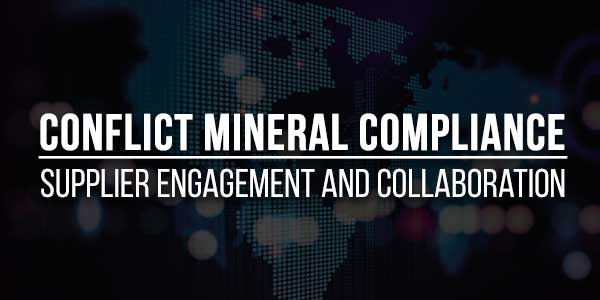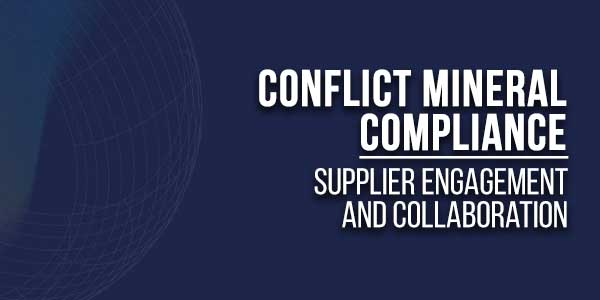
As companies increasingly prioritize ethical and sustainable sourcing practices, conflict mineral compliance has become an important issue. Conflict minerals, such as tin, tungsten, tantalum, & gold, are often sourced from war-torn regions of the world, where their sale can fund armed conflict and human rights abuses. To address this issue, companies must engage with their suppliers and collaborate to ensure that their supply chains are free from conflict minerals.
Table of Contents
Identifying Suppliers:
The first step in supplier engagement is to thoroughly identify all of the suppliers in the supply chain. This process is critical to ensure compliance with conflict mineral regulations and requires a detailed understanding of all suppliers involved in the production and distribution of goods.
Identifying all suppliers can be a challenging and time-consuming process, as supply chains can be complex and involve multiple tiers of suppliers across various regions. This complexity can make it difficult for companies to trace the origin of 3TGs and ensure that they are not sourced from conflict-affected areas.
To overcome these challenges, companies can start by reviewing their current list of suppliers and identifying those that are most likely to be using 3TGs in their products. They can also leverage supply chain management tools and databases to gain insights into their suppliers and their products.
In addition, companies can work with industry associations and other organizations that specialize in supply chain management to get access to supplier lists and other relevant data. These organizations can provide valuable insights into best practices for identifying and engaging with suppliers, as well as access to databases of suppliers and their products.
Once all suppliers have been identified, companies must gather information about their products and supply chains. This includes understanding where the 3TGs are used, how they are sourced, and what measures are in place to ensure conflict-free sourcing. Companies may also need to work closely with suppliers to ensure that they are following responsible sourcing practices and can provide the necessary documentation to support compliance efforts.
In summary, identifying all suppliers in the supply chain is a crucial first step in the supplier engagement process. By taking a detailed approach to supplier identification and engagement, companies can build a more sustainable and responsible supply chain that supports social and environmental stewardship.
Engaging Suppliers:
Engaging suppliers is a crucial step in the compliance process to ensure a responsible and sustainable supply chain. Once suppliers have been identified, it is important to educate them about the importance of conflict mineral compliance and their role in achieving it.
One approach to engaging suppliers is to provide training and resources to help them understand the regulations and the steps they need to take to comply. This can include information on relevant laws and industry standards, due diligence expectations, and reporting requirements. Companies should also guide how to identify and report on the use of conflict minerals in their products.
In addition to training and resources, companies can engage with suppliers through regular communication and collaboration. This includes establishing open lines of communication to address any issues that may arise and to build a collaborative relationship focused on achieving conflict-free sourcing. Companies may also consider working with suppliers to develop action plans to address any identified risks in their supply chains.
Engaging suppliers is not only important for achieving conflict mineral compliance, but it also helps to build a more sustainable and responsible supply chain. By working together and promoting responsible sourcing practices, companies and their suppliers can contribute to a more socially and environmentally responsible business environment.
In summary, engaging suppliers is a critical step in the compliance process and requires a collaborative and transparent approach. By providing training and resources, establishing open lines of communication, and working together to address risks, companies can ensure that their supply chains are conflict-free and aligned with their values and commitments.

Collaborating With Suppliers:
Collaborating with suppliers is a crucial aspect of achieving conflict mineral compliance and building a sustainable and responsible supply chain. Companies must work closely with their suppliers to ensure that they are meeting the necessary standards and that any problems are addressed promptly.
One way to collaborate with suppliers is through regular audits and assessments to ensure that they are meeting their obligations. These audits can include on-site inspections, document reviews, and other measures to verify compliance. Companies may also consider using third-party auditors to provide independent verification of supplier compliance.
In addition to audits and assessments, companies can collaborate with suppliers through open communication and engagement. This includes providing regular feedback on supplier performance, sharing best practices and industry standards, and working together to identify and address any potential risks in the supply chain.
Collaboration with suppliers is also critical for improving supply chain transparency and traceability. By working closely with suppliers, companies can gain a better understanding of their supply chain and identify potential risks and opportunities for improvement. This can help to ensure that all suppliers are meeting the necessary standards and that the supply chain is operating responsibly and sustainably.
In summary, collaboration with suppliers is essential for achieving conflict mineral compliance and building a responsible and sustainable supply chain. By conducting regular audits and assessments, promoting open communication and engagement, and improving supply chain transparency and traceability, companies can work together with their suppliers to promote responsible sourcing practices and contribute to a more sustainable future.
Transparency:
Transparency is indeed a crucial aspect of conflict mineral compliance. Companies must be transparent about their efforts towards achieving compliance, along with the efforts of their suppliers. This can involve publishing reports and disclosing information about their supply chains to stakeholders, including customers, investors, and regulatory bodies. By being transparent, companies can demonstrate their commitment to responsible sourcing and ethical practices, which can help build trust and strengthen relationships with their stakeholders.
Ongoing Monitoring:
Conflict mineral compliance is an ongoing process that demands continuous monitoring and collaboration with suppliers. Companies must continue to monitor their supply chains and work with their suppliers to ensure that they are meeting the necessary standards. To achieve this, ongoing training and education, as well as regular assessments and audits, may be necessary. By doing so, companies can not only maintain compliance with regulations but also promote responsible sourcing practices throughout their supply chain. This ultimately strengthens the company’s reputation and enhances its brand value.
Conclusion:
Conflict mineral compliance is an important issue that requires supplier engagement and collaboration. By working closely with suppliers, companies can ensure that their supply chains are free from conflict minerals. This not only helps to prevent human rights abuses but also promotes ethical and sustainable sourcing practices. Supplier engagement and collaboration are ongoing processes that require ongoing monitoring and assessment. However, by prioritizing conflict mineral compliance, companies can create a more responsible and sustainable supply chain.

 About the Author:
About the Author:












Be the first to write a comment.